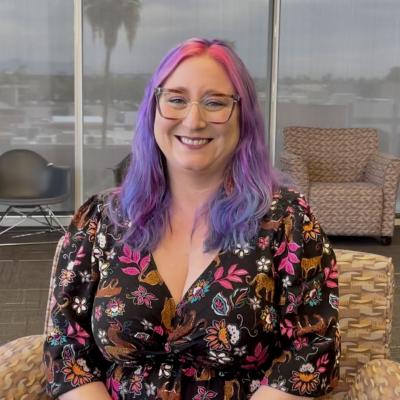New to the School of Social Transformation and Arizona State University, we welcomed a new faculty member to our team this Fall! Crystal Jackson has lived in a few states throughout her professional career, but is originally from Las Vegas, Nevada, and is excited to be back in the southwest. To get to know her better, we decided to ask a few questions.
Tell us about your professional and academic background.
"I never meant to become a professor; I started at the Community College of Southern Nevada (CCSN) and transferred to University of Nevada, Las Vegas (UNLV). I was someone who really wanted to do work that felt impactful, and at first, I didn't understand how being a professor could do that. I wanted to work in the non-profit industry, particularly around women's rights, sexual violence, domestic violence, and sex worker rights. Through feminist mentorship, I was encouraged to go to graduate school where I learned from other feminist professors what it means to engage in teaching, research, and service in order to create a better social world. I enrolled in a sociology graduate program because they did not have women and gender studies opportunities at UNLV. And through my graduate work in the sociology department, I really focused on sexual labors, the political economy of sexual labors, and sex worker rights-- particularly the sex worker rights movement in the US. It was through that involvement as a graduate student that led me to the career that I have today. I was able to publish off of the work that I did studying the Desiree Alliance, a national sex worker rights organization, and today, I am still very involved with sex worker rights organizations locally and nationally."
What’s something you learned during your professional or academic journey that surprised you or changed your perspective?
"There were many awesome, surprising things that I learned during my journey, which is what learning is all about. I am really appreciative of the "women-torship" that I got from some of my faculty when I was doing my graduate work because they taught me things that I don't think I would have learned just by reading. A Latina feminist faculty member, who taught really large sections of women and gender studies, really helped me learn what it means to be student-centered. And what that could mean is not having punitive grading policies or punitive attendance policies, it could mean meeting students where they are at and ensuring all the readings and assignments feel relatable, they're understandable, and that they're reflecting a student's own world experiences. Some other things I've learned along the way is that we can do all the research in the world, get all the data, have all the evidence, but evidence and data alone are not enough to effect change. We can present evidence and data to policy makers and key stakeholders about various social issues around various social problems, but the evidence alone is usually not enough to ensure that people's basic needs are being met. So that's why I love being in SST because we understand that there is that gap and we are trying to figure out how to fill that gap."
What types of social problems do you work on?
"It's interesting when people ask me questions like this. My research, if you look at the titles of what I do, is about the political economy of sexual labor and sex worker rights in the US. But the actual social problems, like sex work, is not the social problem. The social problems are the criminalization of sex work, poverty, racism, and cruelty towards people who are undocumented immigrants; it's being able to peel back all the layers and realize that there's a lot more going on. If you dig a little deeper through research and activism, that's really the only way we can create social change. Studying social problems is to look for that social justice goal. It's not just about the social problem, it's about what we're going to do about it. And for sex workers and sex worker rights, through my research and their activism, that means decriminalizing the sale of sex."
What are you most excited for during your first year at ASU?
"As a new faculty member here, this first year is really about building relationships and connections. So, learning who my students are, getting to know my peers here in SST, and also exploring campus, because this campus is huge and is a bit intimidating to walk around! This first year is focused on starting to feel what it means to be a Sun Devil and a Sun Devil in SST."
What advice do you have for students?
"Be open-minded, be curious, ask lots of questions, annoy your professors-- that's not a bad thing. We want you to come visit us, we want you to challenge us because you are also holders of knowledge, and the only way we are going to create a better social world is by working together to understand our collective knowledges and putting them together."
